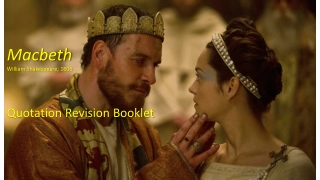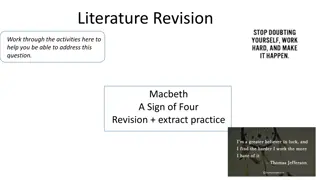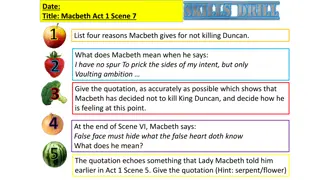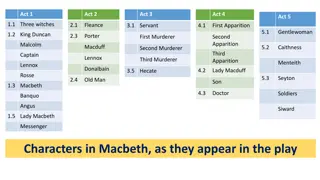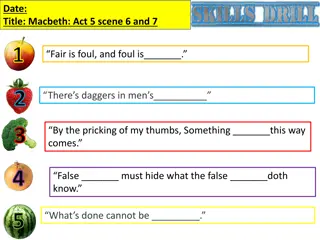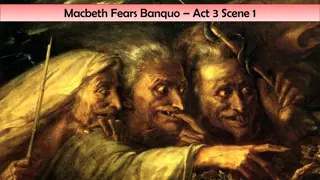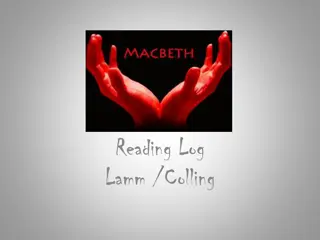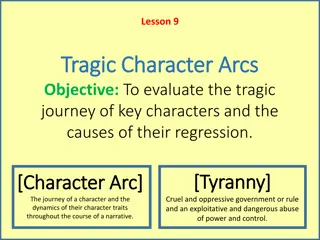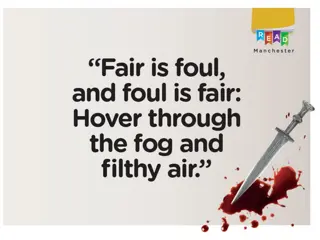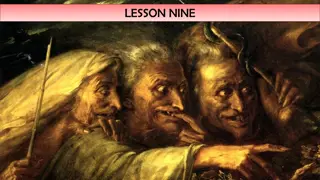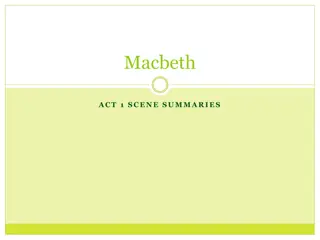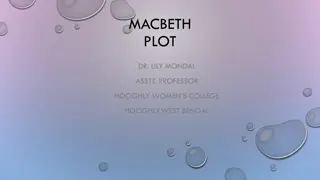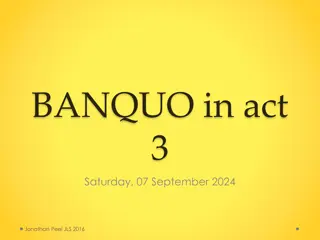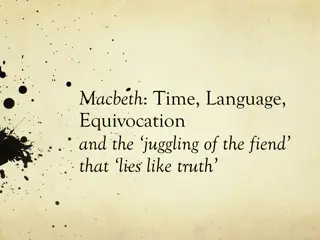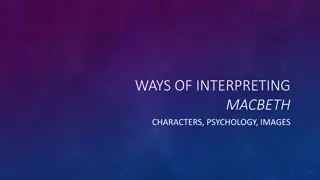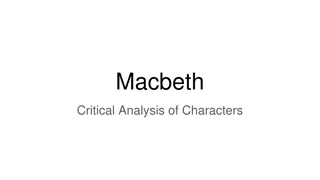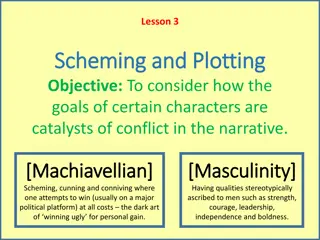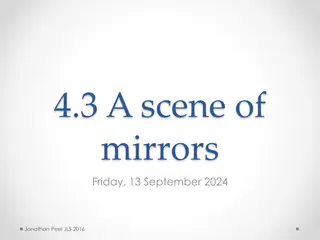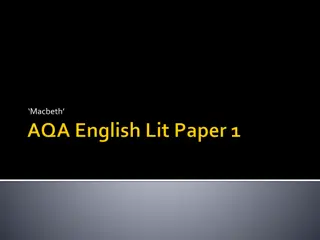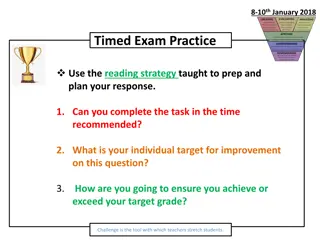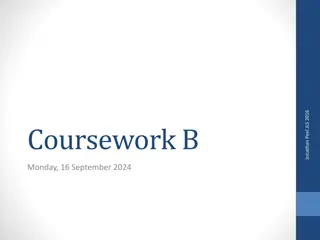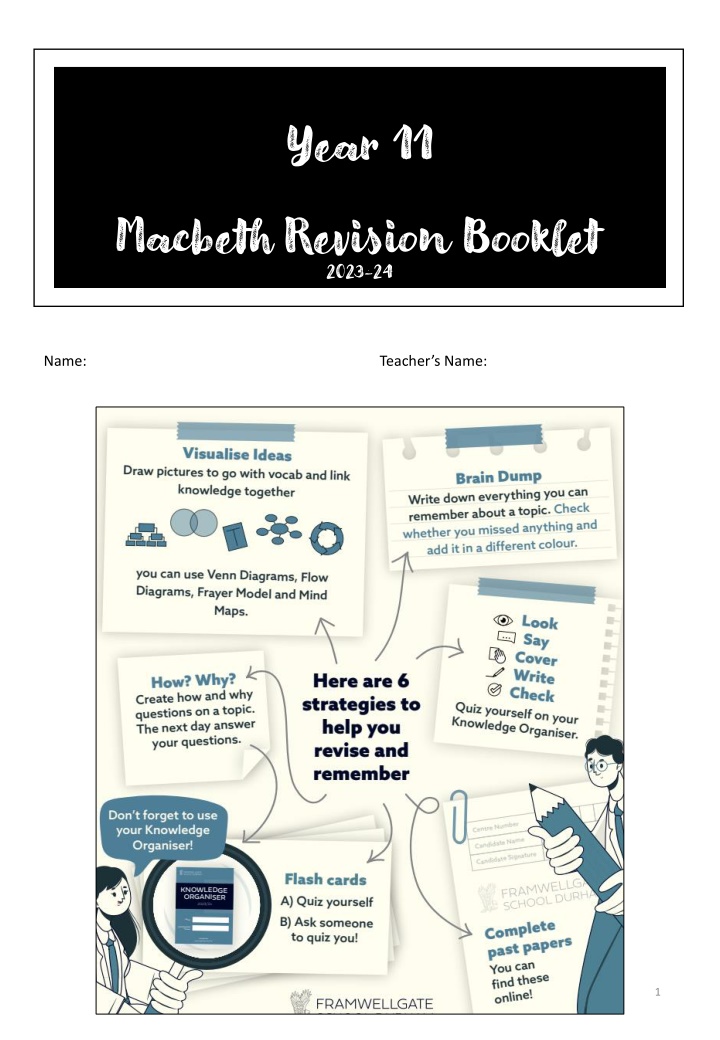
Macbeth Plot Summary: Ambition and Betrayal Unfold
Discover the tale of Macbeth, a story of power, corruption, and consequences. Follow Macbeth's journey as he succumbs to ambition, betrayal, and the supernatural forces that shape his destiny. Witness the tragic downfall of a man driven by greed and the thirst for power in Shakespeare's timeless play.
Download Presentation

Please find below an Image/Link to download the presentation.
The content on the website is provided AS IS for your information and personal use only. It may not be sold, licensed, or shared on other websites without obtaining consent from the author. If you encounter any issues during the download, it is possible that the publisher has removed the file from their server.
You are allowed to download the files provided on this website for personal or commercial use, subject to the condition that they are used lawfully. All files are the property of their respective owners.
The content on the website is provided AS IS for your information and personal use only. It may not be sold, licensed, or shared on other websites without obtaining consent from the author.
E N D
Presentation Transcript
Year 11 Macbeth Revision Booklet 2023-24 Name: Teacher s Name: 1
Plot Summary Use the plot summary to complete the diagram on the next page. Macbeth is the story of power and how it corrupts. The play begins with the three witches, who plan to meet the great warrior Macbeth who is currently engaged in battle. It already seems that supernatural forces are going to control the play s action. The scene shifts rapidly to the camp of King Duncan, who is waiting for news of the battle. A wounded captain enters, telling Duncan of Macbeth and Banquo s courage and prowess on the battlefield as they have defeated not one, but two armies (from Ireland and Norway). Macbeth has killed the traitor Macdonawald, placing his head on a spike to show that treachery against Scotland will be punished. Duncan also receives news of a second traitor the Thane of Cawdor. Duncan orders the Thane s execution, and announces that Macbeth will be the next Thane of Cawdor. Elsewhere, Macbeth and Banquo are travelling home from the battle. Suddenly, the witches appear and pronounce several mysterious prophecies. Macbeth will be Thane of Glamis (he already is, following his father s death), Thane of Cawdor, and King of Scotland. The witches tell Banquo that he will not be king, but his sons will be monarchs. The witches vanish, and King Duncan s messengers appear out of the mist and announce that Macbeth has been made Thane of Cawdor. This information convinces Macbeth that the witches prophecies are true, and he starts to think of murdering Duncan so that he can become King of Scotland. Macbeth and Banquo arrive at Duncan s camp, just in time for a ceremony in which Duncan names his eldest son (Malcolm) as his heir. Macbeth is seized by black and deep desires as he becomes increasingly convinced that his only path to the throne is murder. Macbeth leaves, but invites Duncan to his castle for a feast. Waiting in Macbeth s castle, Lady Macbeth receives a letter from her husband, in which he explains the witches prophecies. Lady Macbeth is determined to make her husband a king, and she calls on spirits to unsex her and take away her remorse. Macbeth enters and they plan to murder Duncan that evening, when he comes to their castle for the feast. As the time of the murder approaches, Macbeth suffers doubts and fears. Yet his wife convinces him to continue with the plan. Lady Macbeth drugs Duncan s chamberlains (guards) and Macbeth takes a dagger to murder Duncan in his bedroom. He emerges from the murder scene with the daggers still in his hand Lady Macbeth is horrified as he has brought evidence with him from the room. She returns the daggers to the scene of the crime and she smears Duncan s blood on the chamberlains, so that they appear to be guilty. The murderous pair rush to bed just as Macduff knocks on the castle gate, signalling that it is time for him to collect Duncan for the next stage of the journey. Macduff wakes Macbeth, who shows him to Duncan s room, where the body is discovered. The alarm is rung and, in the confusion, Macbeth kills Duncan s chamberlains he pretends to believe that they have committed regicide. Afraid for their own lives, Duncan s sons flee: Malcolm goes to England while Donalbain goes to Ireland. Macbeth is the next in line to the throne, and is crowned. However, Macduff appears to be becoming suspicious of him, and Macbeth is tortured by the idea that he has no children and that Banquo s sons will become kings. To stop this from happening, Macbeth orders murderers to kill Banquo and his son (Fleance). Macbeth and Lady Macbeth hold a feast for the Thanes, during which the murderers bring news that they have killed Banquo, but Fleance has escaped. Banquo s ghost then appears to Macbeth at the feast, and he appears to lose his sanity in front of his thanes. Lady Macbeth commands them to leave and it is clear that Macbeth s kingship is already crumbling under the burden of guilt and mistrust. Macbeth increasingly isolates himself from his wife, and so he returns to see the witches to ask for advice. They give him new prophecies: beware Macduff; Macbeth cannot be killed by anyone not born of woman; Macbeth will not be killed until Birnam Wood comes to Dunsinane Castle. Finally, they show Macbeth a vision of Banquo s children becoming kings. As a result of the first prophecy, Macbeth sends soldiers to kill Macduff and his family but Macduff has already gone to England to join Malcolm. His innocent wife and children are savagely slaughtered . The Thane of Ross rides to England to tell Macduff what has happened, and he is broken by grief. However, he then vows revenge against Macbeth. Macduff and Malcolm have been gathering an army with the help of the King of England and they start to move towards Scotland. In the meantime, Macbeth is becoming increasingly nihilistic and Lady Macbeth commits suicide. Despite his despair, when a messenger brings news of Malcolm and Macduff s arrival along with their army Macbeth is determined to fight. Many of his own soldiers have abandoned him, but he is sustained by his belief in the witches prophecies he can only be killed by someone not born of women. However, Macbeth s faith is shaken when the English soldiers cut down branches from Dunsinane Wood and carry them as camouflage one of the witches seemingly impossible warnings has come true. The army attacks, and Macduff finds Macbeth. They engage in battle, during which Macduff reveals that he was born via a Caesarean section and is therefore not born of woman . Macbeth has a moment of anagnorisis in which he realises that the witches have deceived him. Macduff kills Macbeth and - in an echo of Macbeth s killing of Macdonwald cuts off his head and puts it on the end of his sword. The play concludes with Macduff satisfied that he has gained his revenge, and Malcolm becomes King of Scotland. 4
Climax Falling Action Rising Action Exposition Denouement 5
Historical Context Read the information and use it to complete the table Patriarchal societies and the role of women William Shakespeare wrote during the reigns of two different monarchs: Queen Elizabeth I (1558-1603) and King James I (1603-1625). Whilst the Elizabethan period was a time of relative stability in England, the fact that she did not marry nor have children brought a certain amount of uncertainty to the nation as it was not clear who her heir would be. However, concerns about civil war and a bloody fight for the throne did not materialise, and James succeeded Elizabeth. It is important to consider the impact that both these monarchs had on Shakespeare s creation of the play Macbeth. Queen Elizabeth acceded to the throne in a patriarchal society, in which men dominated and women tended to be subservient, expected to obey male relatives. Regarded as the weaker sex, women were generally denied the same rights and privileges as men. Despite this, Elizabeth s rule demonstrated that it was possible for women to become leaders although perhaps Shakespeare s presentation of Lady Macbeth reveals contemporary concerns about what happens when women hold too much power and to assume a stereotypically masculine role. Persecution of Catholics Gunpowder Plot In Macbeth, Duncan chooses his heir: his eldest son, Malcolm. However, after Macbeth assassinates Duncan, Malcolm flees and it is the murderer who seizes the throne. This disordered transfer of power might reflect some of the anxieties which followed the death of Queen Elizabeth. However, when James I became king, he powerfully restored a sense of order although this was often maintained through violence and persecution. In a book entitled The Daemonologie, James explained his attitude to witchcraft: he supported witch trials and executions. James also continued persecution against Catholics, which sparked the Gunpowder Plot of 1605. This involved a group of Catholic rebels planning to blow up the Houses of Parliament in order to kill James and install a Catholic monarch on the throne. Whilst the plot was not successful, Shakespeare explores the theme of regicide and assassination in Macbeth, revealing the disastrous consequences of killing a monarch: perhaps the play acts as a warning to those who would rebel against the legitimate ruler? The Divine Right of Kings The Great Chain of Being Concerns about tyrant King James believed firmly in the idea of the Divine Right of Kings. This was a belief that monarchs were appointed by God, and held absolute power over their people. Linked to this is the concept of the Great Chain of Being, a belief that God had given every person a place within the social hierarchy (women, for example, were lower in the hierarchy than men, whilst monarchs were closer to God). In Macbeth, it is clear that several of the characters hold these views. Duncan is described as being like an angel , whilst Macduff is deeply disturbed by the destruction of the Divine Right of Kings: when he finds Duncan s body, he cries horror! Horror! Horror! Hypermasculinity However, the fact that the monarch was believed to hold absolute power led to anxieties about tyranny. If a king or queen is not answerable to their people, then this could result in bloody consequences. For example, the reign of King Henry VIII resulted in 57,000 deaths. Shakespeare presents Macbeth as a corrupt tyrant, only interested in maintaining his own power and securing his place on the throne. In portrayed Macbeth in this way, Shakespeare warns leaders about the importance of avoid tyrannical rule. Several other new models of leadership were also emerging during Shakespeare s time. On the one hand, there was the ideal of the hypermasculine warrior. Hypermasculinity means exaggerated expectations of stereotypical male behaviour. In this view, society celebrated men s courage and prowess on the battlefield and violence was celebrated when it used in the service of the King. Consider, for example, the Captain s description of Macbeth and Banquo in Act 1 Scene 2. In contrast to this, an Italian writer called Niccol Machiavelli composed a text entitled The Prince. In this book, Machiavelli advocated using intelligence and cunning not brute force to gain power. Shakespeare explores the consequences of this ideology: what happens when a Machiavellian character (like Lady Macbeth) gains power? Machiavellianism 6
Aspects of Tragedy In Macbeth, Shakespeare uses many conventions of tragedy which are often attributed to a Greek philosopher called Aristotle. Use the information below to complete the table below. According to Aristotle, the aim of tragedy is to bring about catharsis in the audience. Catharsis is usually defined as the purgation of pity and fear. Think about the feeling you have when watching a really tense film or TV programme and the relief that you have when you know the ending. In Macbeth, the audience experiences this when Macduff murders the illegitimate king and order is finally restored at the denouement. In creating these emotions, tragedies leave the audience with a greater understanding of the complexities and fragility of the human condition (what it means to exist as a person on this planet). Just as Macduff realises that life is short and precious when his family are brutally murdered, the audience also understands that we all suffer and are mortal. In an Aristotelian tragedy, the play moves from order to chaos, before order is restored at the denouement. This process takes place across the five sections of the play: the exposition (characters and plot are introduced), rising action (the tension starts to build and a problem arises), the climax (the moment of highest tension), the falling action (the story starts to become resolved), and the denouement (the ending where order is restored and the loose ends are tied up). Whilst this is a matter for some discussion amongst literary critics, it is possible to suggest that in Macbeth the sections are as follows: exposition (introduce witches, Macbeth, Banquo); rising action (witches prophecies, Macbeth and Lady Macbeth plan the murder); climax (the banquet scene); the falling action (Macduff goes to England, Lady Macbeth dies); and the denouement (Macduff kills Macbeth and Malcolm becomes King). Within this structure, tragedies usually contain a tragic hero. This is a protagonist who is highly renowned and prosperous, but who is not completely virtuous. The tragic hero makes an error of judgement or has a moral flaw which leads to his downfall. That is the tragic hero is like all of us: flawed and imperfect. This helps the audience to sympathise with the hero s death. The error of judgement or character flaw is known as hamartia. For Macbeth, this could be his overwhelming ambition or his excessive pride (hubris). At the denouement of the play, the tragic hero has a moment of anagnorisis a realisation of the truth. We see this in Macbethwhen he realises that Macduff has not been born of woman and that the witches have therefore tricked him. At this point, we may feel pathos (pity) for Macbeth. Aspect of tragedy Definition Example from the play Tragic hero Exposition Rising action Climax Falling action Denouement Pathos Catharsis Anagnorisis Human condition Hubris 7
Macbeth: Character Summary At the start of the play, Macbeth is a celebrated hero a warrior who has defeated not one, but two armies, and is praised by his soldiers and his king. At the end of the play, Macbeth is vilified as a traitor and a tyrant, and his decapitated head is held up on a sword. Bullet point summary The play dramatizes the story of how this transformation happens. Before we meet Macbeth in Act 1 Scene 3, Shakespeare provides us with different characters perspectives on the eponymous tragic hero. In Act 1 Scene 1, the witches see him as a heroic leader but also plan to take control over his life. The motif of heroism is continued in Act 1 Scene 2, in which the captain describes Macbeth as valour s minion who unseamed [the traitor Macdonwald] from the nave to the chops . Yet even in this early description, the audience has the sense that Macbeth is not just an honourable hero, but is also motivated by bloodlust. His relentless pursuit of violence is also unsettling. As the play progresses, Shakespeare reveals how the witches light the spark of ambition in Macbeth s heart. Shakespeare juxtaposes Macbeth with Banquo, as the former immediately believes the witches, whilst the latter is more sceptical and questioning. Macbeth believes that this supernatural soliciting / Cannot be ill cannot be good . This quotation suggests that at this point, Macbeth is going to wait to see what will happen as a result of the meeting with the witches, as their words cannot be ill and bring destruction on him. Yet in the following scene, Duncan destroys Macbeth s hopes of being named as his heir to the throne, and the tragic hero is plunged immediately into black and deep desires . Here, the adjective black connotes the evil and destruction we may associate with the witches, while desires implies that Macbeth is motivated by a lust for power. Yet in the rising action, Shakespeare consistently suggests that Macbeth is not sufficiently determined to take the throne. In Act 1 Scene 5, Lady Macbeth describes her husband, complaining that he is too full of the milk of human kindness / To catch the nearest way . The nearest way to the throne is murder, but Lady Macbeth believes that her husband has the stereotypically feminine qualities ( milk ) of compassion and love meaning that he will not be able to kill his friend. Many literary critics have spent a considerable amount of time debating whether Macbeth kills Duncan as a result of the witches influence, Lady Macbeth s manipulation, or his own ambition. This scene provides evidence that it is Lady Macbeth who pushes Macbeth into the act of regicide, as when he speaks to her about the murder she takes charge. She tells him to look like the innocent flower, but be the serpent under it . Shakespeare uses the image of the flower to suggest that the couple will put on a fa ade, pretending to be virtuous and loyal to Duncan. In reality, they will be the serpent a Biblical allusion to the devil, who will betray anyone for his own purposes. Despite his wife s manipulation, Macbeth is still unsure about whether or not to commit the murder. He recognises his own vaulting ambition, which overleaps itself . At this moment, Shakespeare implies that Macbeth recognises his own hubris and hamartia, and knows that regicide will lead him to disaster. Once again, it is Lady Macbeth who convinces her husband to act violently. This time, she metaphorically emasculates her husband, saying when you durst do it, then you were a man . This means that if Macbeth kills Duncan, he will prove his masculinity. For a warrior living in a hypermasculine society, these words are extremely powerful. As a result of the witches prophecies, Lady Macbeth s words, and his own desires, Macbeth s mind becomes heat-oppressed , and in this state of anxiety he sees a dagger in the air in front of him. The dagger appears to lead the way to Duncan s chamber, and draws Macbeth on to regicide. Is this dagger a vision sent by the witches to further control Macbeth? Or is it a product of his own mind? Either way, he follows the dagger and murders his friend, King, and cousin. 8
In Act 2 Scene 2, Shakespeare highlights how Macbeth is plunged into torment as soon as he has committed the murder. He returns from Duncan s room, carrying the daggers and with his hands covered in his friend s blood. Macbeth asks will all great Neptune s ocean wash this blood / Clean from my hand? Here, the blood symbolises his guilt, which Macbeth believes will never be washed away even by all the water in the world. Water is a religious allusion, as in the Bible the waters of baptism wash away human sin and purify the soul. Shakespeare juxtaposes Macbeth s words with Lady Macbeth s reaction, as she takes command, returning the daggers to the guards and insisting that they wash their hands. Bullet point summary After this, events happen very quickly. Duncan s body is discovered, his sons flee, and Macbeth is crowned king. At the start of Act 3, Shakespeare portrays Macbeth as a king tormented by guilt and the futility of his actions. Macbeth is increasingly upset by the fact that he has no children, and he laments hi fruitless crown . The crown symbolises the power, wealth, and privilege Macbeth has gained whilst this is juxtaposed with the adjective fruitless , which indicates that he cannot have children. His childlessness causes him to question his masculinity, and also means he is unable to found a dynasty of kings. In a particularly poignant line, Macbeth tells Lady Macbeth that full of scorpions is my mind, dear wife . The image of the scorpions conveys the mental pain and suffering Macbeth endures, whilst the phrase dear wife indicates his emotional reliance on Lady Macbeth. However, Shakespeare indicates a shift in their relationship, as Macbeth no longer trusts Lady Macbeth with his plans. Despite the fact that he is going to order Banquo s murder, he tells his wife: be innocent of the knowledge, dearest chuck . In this quotation, Shakespeare echoes an earlier line: look like the innocent flower . But here, it is Macbeth who commands his wife. The name dearest chuck is diminutive and belittles Lady Macbeth she is no longer his dearest partner in greatness , but a wife who must do as she is commanded. Act 3 Scene 4 is the climax of the play, and perhaps the most dramatically powerful scene. Macbeth hosts a feast for his Thanes, but it is interrupted by Banquo s ghost who appears only to the guilt-ridden host. Shakespeare vividly presents Macbeth as unravelling. He is not only losing control over himself, but also of his marriage, his Thanes, and Scotland. In an attempt to take back control, Macbeth commands Banquo s ghost: never shake thy gory locks at me . However, the imperative falls on deaf ears, whilst the visual impact of the bloody hair ( gory locks ) echoes the blood-stained hands of Act 2. Plagued with doubts and remorse, Macbeth seeks help from the witches. Here, Shakespeare emphasises how far Macbeth has fallen: instead of being ensnared by the weird sisters, he is turning to these servants of the devil of his own volition. On his return home, he isolates himself from his wife and orders the vicious murders of women and children: Macbeth has truly become an untitled tyrant, bloody- sceptered . As Malcolm and Macduff s army approaches in Act 5, Macbeth descends into nihilism, and reflects on the pointlessness of his life. Prompted by his wife s suicide, he says tomorrow, and tomorrow, and tomorrow . In this line, Shakespeare emphasises how the tragic hero sees his life stretching endlessly in front of him, empty and without direction. By adding an extra syllable into the expected iambic pentameter, Shakespeare extends the rhythm of the line to mirror Macbeth s sense of a hollow expanse of time. Ultimately, for Macbeth life is now full of sound and fury, signifying nothing . Yet Shakespeare still presents Macbeth as delusional, as he chooses to fight Macduff even though his own death now seems inevitable. Defeated by his rival, Macbeth s head is decapitated and lifted up on a sword in an act which mirrors Macbeth s killing of the traitor Macdonwald in Act 1. Macbeth is reduced to an upstart traitor, and the head is a warning to the Scottish people not to betray their king. Overall, Shakespeare uses Macbeth to show the destructive consequences of unchecked ambition on society, family, and one s own psychological state. 9
Three things about three things Key moment 1: Act 1 Scene 1: Unseamed him from the nave to the chops Key moment 2: Act 1 Scene 4: my black and deep desires Key moment 3: Act 1 Scene 5: Lady Macbeth says Macbeth is too full of the milk of human kindness. Key moment 4: Act 2 Scene 2: Will all great Neptune s ocean wash this blood / Clean from my hand? 10
Three things about three things Key moment 5: Act 3 Scene 1: a fruitless crown Key moment 6: Act 3 Scene 2: Full of scorpions is my mind, dear wife Key moment 7: Act 5 Scene 5: Tomorrow and tomorrow and tomorrow Full of sound and fury, signifying nothing. Key moment 8: Act 5 Scene 8: Malcolm calls Macbeth this dead butcher . 11
Macbeth: Vocabulary Check Define these keywords 1. Tragic hero 2. Courageous 3. Hubristic 4. Hamartia 5. Emasculated 6. Remorseful 7. Apprehensive 8. Tyrannical 9. Tormented 10. Defiant Now use the words to write a paragraph describing Macbeth. _______________________________________________________________________________________________ _______________________________________________________________________________________________ _______________________________________________________________________________________________ _______________________________________________________________________________________________ _______________________________________________________________________________________________ _______________________________________________________________________________________________ _______________________________________________________________________________________________ _______________________________________________________________________________________________ _______________________________________________________________________________________________ _______________________________________________________________________________________________ 12
Example Exam Question Example Exam Question Help on this scene from Mr Bruff: https://www.youtube.com/watch?v=Xe7j0UHMbOA&list=PLqGFsWf-P- cCMpq89C0yaU5scvuYiIKuL&index=10 Read the following extract from Act 1, scene 3 then answer the question that follows. At this point in the play, Macbeth has just been told that he is to be the new Thane of Cawdor: the second of the witches prophesies has come true. Understand the extract: Who is in it? MACBETH [Aside] Two truths are told, As happy prologues to the swelling act Of the imperial theme.--I thank you, gentlemen. Where are they? (Aside) This supernatural soliciting Cannot be ill, cannot be good: if ill, Why hath it given me earnest of success, Commencing in a truth? I am thane of Cawdor: If good, why do I yield to that suggestion Whose horrid image doth unfix my hair And make my seated heart knock at my ribs, Against the use of nature? Present fears Are less than horrible imaginings: My thought, whose murder yet is but fantastical, Shakes so my single state of man that function Is smother'd in surmise, and nothing is But what is not. When is this in the play? What is happening? Why is this happening? Starting with this speech, explain how you think Shakespeare presents Macbeth s conflicted state of mind. Write about how Shakespeare presents Macbeth in this extract; how Shakespeare presents Macbeth in the play as a whole. 30 marks + 4 marks AO4 5 minute plan Point Quotation Beginning of extract Middle of extract End of extract Rest of play 1 Rest of play 2 13
Lady Macbeth: Character Summary Shakespeare first introduces Lady Macbeth in Act 1 Scene 5, in which she is shown reading a letter from her husband a letter which tells of the witches and their mysterious prophecies. Lady Macbeth is immediately filled with ambition for her husband and she is desperate to give him the golden round (crown) of Scotland. In order to achieve her aims, Lady Macbeth knows that she must act unconventionally, and so she appeals to the spirits to fill her with direst cruelty and to unsex me here . This request to become less feminine and more masculine suggests her desire to rid herself of the weakness and compassion associated with women, and instead to become powerful and remorseless. Bullet point summary There are many possible reasons for Lady Macbeth s ruthless ambition and for her appeal to the spirits. It is possible that she herself is deeply ambitious and desires to be queen. However, Shakespeare continually draws our attention to the fact that whilst she wants Duncan to be murdered, this is so that Macbeth can be king. The motif of their childlessness is found throughout the play (elsewhere Macbeth laments his fruitless crown ), and one explanation is that Lady Macbeth feels that she needs to compensate for being unable to have children and that she does so by giving her husband his greatest desire. Whatever the reason for her actions, Macbeth arrives shortly after his dearest partner in greatness reads the letter, and Lady Macbeth pushes him towards murder. In the following scene, Duncan arrives at the castle and is welcomed by Lady Macbeth. This scene is full of dramatic irony as Duncan lavishes praise on our honoured hostess , whilst she maintains a fa ade of honesty and loyalty. Shakespeare is clearly emphasising Lady Macbeth s deceptive nature, whilst also highlighting how leaders should not be overly trusting and credulous. As the time for the murder approaches, Macbeth equivocates, unsure as to whether to go through with the deed. Shakespeare therefore presents Lady Macbeth as the driving force behind the murder, as she tells her wavering husband to screw your courage to the sticking- place / And we ll not fail . Her consistent use of imperative verbs in the first section of the paly indicates that she is in command, whilst the inclusive pronoun ( we ) indicates that her ambition is for both of them. Shakespeare contrasts this with Macbeth s use of singular pronouns after the murder, when he starts to isolate himself from his wife. Whilst in Act 1 Scene 5, it seems that Lady Macbeth is planning to commit the murder herself ( my keen knife ), when it comes down to it Duncan looks too much like my father and she leaves the deed to Macbeth. When the couple meet after the murder, Shakespeare juxtaposes their reactions, highlighting Macbeth s immediate remorse and horror whilst his wife is cool and determined. Whereas Macbeth sees the blood on his hands as a symbol of unspeakable regicide, Lady Macbeth insists that a little water clears us of this deed . However, there is a hint of her guilt here: Shakespeare includes the euphemism deed to indicate that Lady Macbeth is unable to use the word murder , implying that she is putting on a fa ade of courage and is herself unable to come to terms with what they have done. Lady Macbeth stays focussed for long enough to return the daggers to the chamberlains and to cover them with blood, and to get her husband to bed before the body is discovered. After this, Shakespeare diminishes Lady Macbeth s role in the play as she appears less frequently and the seed of guilt which was sown in Act 2 Scene 2 grows. At the start of Act 3, Macbeth confesses to her that his mind is full of scorpions , and she acknowledges that tis safter to be that which we destroy, / Than by destruction dwell in doubtful joy . That which we destroy is Duncan, and dwell in doubtful joy means that they are living in uncertain happiness which could be lost at any time. Yet this is the last moment of intimacy between the couple, as Macbeth refuses to tell her about his plans to have Banquo murdered (he silences her questions with the patronising be innocent of the knowledge, dearest chuck ). Act 3 Scene 4 is the last time we see the couple together. This is the banquet scene in which Macbeth sees Banquo s ghost, and Lady Macbeth fails to calm her husband s reaction. When we see Lady Macbeth next, it is at the start of Act 5 and she has descended into madness, sleepwalking and walking, and continually trying to wash blood from her hands. Whereas in Act 2 Scene 2, she insisted that a little water would clean Duncan s blood away, she is now obsessed with the smell of the damned spot that marks her skin a metaphorical representation of her deep-seated and inescapable guilt. In an echo of Macbeth s earlier line about Neptune s Ocean , she believes that all the perfumes of Arabia will not sweeten this little hand . It is notable that Shakespeare has shifted from blank verse to prose (from 10 syllables per line to an irregular rhythm), indicating Lady Macbeth s loss of control. Lady Macbeth s death is elided (not included) on stage, but it is reported a few scenes later when Macbeth s servant mentions it to the new king. Macbeth s response is cold: she should have died hereafter . The powerful, determined, unconventional woman who gave everything for her husband is dismissed as an afterthought as he turns his mind to the coming battle. Whereas she is Macbeth s dearest partner in greatness in Act 1, now Lady Macbeth is reduced to a nameless she who is quickly forgotten. 14
Three things about three things Key moment 1: Act 1 Scene 5: Macbeth is too full of the milk of human kindness. Unsex me here Key moment 2: Act 1 Scene 5: Look like the innocent flower, but be the serpent under it. Key moment 3: Act 1 Scene 6: Duncan says our honoured hostess. Key moment 4: Act 1 Scene 7: Screw your courage to the sticking-place, / And we ll not fail. 15
Three things about three things Key moment 5: Act 2 Scene 2: A little water clears us of this deed. Key moment 6: Act 3 Scene 2: Tis safer to be that which we destroy, / Than by destruction dwell in doubtful joy. Key moment 7: Act 5 Scene 1: Out damned spot. All the perfumes of Arabia will not sweeten this little hand. Key moment 8: Act 5 Scene 5: Macbeth She should have died hereafter. 16
Lady Macbeth: Vocabulary Check Define these keywords 1. Soliloquy 2. Ruthless 3. Unconventional 4. Imperative verbs 5. Distraught 6. Tormented 7. Pathos 8. Vulnerable 9. Prose Now use the words to write a paragraph describing Lady Macbeth. _______________________________________________________________________________________________ _______________________________________________________________________________________________ _______________________________________________________________________________________________ _______________________________________________________________________________________________ _______________________________________________________________________________________________ _______________________________________________________________________________________________ _______________________________________________________________________________________________ _______________________________________________________________________________________________ _______________________________________________________________________________________________ _______________________________________________________________________________________________ 17
Example Exam Question Example Exam Question Help on this scene from Mr Bruff: https://www.youtube.com/watch?v=NTAzMZibA24&list=PLqGFsWf-P- cCMpq89C0yaU5scvuYiIKuL&index=15 Read the following extract from Act 1 Scene 5 of Macbeth and then answer the question that follows. At this point in the play Lady Macbeth is speaking. She has just received the news that King Duncan will be spending the night at her castle. Understand the extract: Who is in it? LADY MACBETH The raven himself is hoarse That croaks the fatal entrance of Duncan Under my battlements. Come, you spirits That tend on mortal thoughts, unsex me here, And fill me from the crown to the toe topfull Of direst cruelty; make thick my blood, Stop up th access and passage to remorse That no compunctious visitings of nature Shake my fell purpose nor keep peace between Th effect and it. Come to my woman's breasts, And take my milk for gall, you murd ring ministers, Wherever in your sightless substances You wait on nature's mischief. Come, thick night, And pall thee in the dunnest smoke of hell, That my keen knife see not the wound it makes Nor heaven peep through the blanket of the dark, To cry Hold, hold! Where are they? When is this in the play? What is happening? Why is this happening? Starting with this speech, explain how far you think Shakespeare presents Lady Macbeth as a powerful woman. Write about: how Shakespeare presents Lady Macbeth in this speech how Shakespeare presents Lady Macbeth in the play as a whole. [30 marks] AO4 [4 marks] 5 minute plan Point Quotation Beginning of extract Middle of extract End of extract Rest of play 1 Rest of play 2 18
Macduff: Character Summary Throughout the play, Shakespeare uses Macduff to symbolise loyalty to the rightful monarch as he is committed to the Divine Right of Kings. It is Macduff who knocks on the gates to the Macbeths castle in Act 2, intending to wake Duncan so that he can accompany him on the next step of his journey but instead finding his dead body. In this scene, Shakespeare equates Macduff with the Biblical figure of Christ, who before his final ascension to Heaven, knocks on the gates of hell so that he can release the damned (the so-called Harrowing of Hell ). Despite being overwhelmed with grief and dismay, Macduff quickly starts to ask questions and is clearly suspicious of Macbeth. Shakespeare emphasises this when Macbeth explains that he has killed the chamberlains in his fury , and Macduff does not accept this, but instead asks wherefore [why] did you so? Bullet point summary In the following scene, Macduff and the Thane of Ross discuss Macbeth s accession to the throne of Scotland. Macduff announces his intention not to attend to the coronation which is an act of defiance against the new king, and signals his disloyalty to Macbeth. Macduff s inability to hide his scepticism and suspicion of Macbeth is part of the reason why the new king punishes the Macduff family. Another reason for this act is that when Macbeth visits the witches for the second time, their apparitions warn him to beware Macduff . Whatever the reason, Macbeth sends his murderers to Macduff s castle to kill his family. As he has already left to find Malcolm in England, Macduff is not there to defend his wife and children and so they are savagely slaughtered . Unlike the murder of Duncan (which is elided from the play not shown on stage), Shakespeare does dramatize this murder scene. The brutal murder of innocent, defenceless victims represents the depths of Macbeth s malevolence, whilst the fact that Macbeth does not commit this act himself indicates his inability to face up to the crimes he is committing. In the following scene, Shakespeare shifts the setting to Malcolm s camp in England, where the rightful heir tests Macduff s loyalty. Macduff insists that Macbeth is an untitled tyrant bloody-sceptered . The adjective untitled indicates that Macduff thinks that Macbeth does not deserve the title of king that he has taken, whilst tyrant indicates his belief that the new king is misusing his power for his own ends. Macduff proves himself to be loyal just before the Thane of Ross arrives with the news of the latest murders. In contrast to Macbeth s cold reaction to his own wife s death, Macduff s response is heart-breaking: Shakespeare presents him as broken-hearted and plunged into despair. When Malcolm tells him to dispute it like a man attempting to remind Macduff that such grief is not a stereotypically masculine response Macduff responds I must also feel it like a man . Here, Shakespeare clearly juxtaposes the characters of Macbeth and Macduff. Earlier in the play, Shakespeare has highlighted Macbeth s sensitivity about his masculinity, and Lady Macbeth repeatedly uses this to manipulate her husband. However, Macduff is confident in himself and is able to display stereotypically feminine grief and emotion without fearing embarrassment. Together, Macduff and Malcolm round up an army and march to Scotland. It is Macduff who finds Macbeth in his castle, determined to exact revenge for his family s deaths. Macbeth is confident as he knows that he cannot be killed by anyone born of woman but Macduff reveals that he was untimely ripped from his mother s womb. Macbeth realises that he has been tricked by the witches, as being born by Caesarean section means that Macduff was technically brought into the world by a man. Macduff triumphs and decapitates Macbeth, just as Macbeth cut the head off the traitor Macdonwald in Act 1. Overall, Shakespeare presents Macduff as the archetype of the avenging hero, who does not want vengeance for its own sake, but wishes to restore order and morality to Scotland. 19
Three things about three things Key moment 1: Act 2 Scene 3: Horror! Horror! Horror! Most sacrilegious murder hath broke ope The Lord's anointed temple Key moment 2: Act 4 Scene 3: Macbeth is an untitled tyrant, bloody- sceptered . Key moment 3: Act 4 Scene 3: All my pretty ones? . I must also feel it like a man Key moment 4: Act 5 Scene 8: Behold the usurper s cursed head. 20
Macduff: Vocabulary Check Define these keywords 1. Virtuous 2. Patriotic 3. Courageous 4. Integrity 5. Vengeance 6. Nemesis Now use the words to write a paragraph describing Macduff. _______________________________________________________________________________________________ _______________________________________________________________________________________________ _______________________________________________________________________________________________ _______________________________________________________________________________________________ _______________________________________________________________________________________________ _______________________________________________________________________________________________ _______________________________________________________________________________________________ _______________________________________________________________________________________________ _______________________________________________________________________________________________ _______________________________________________________________________________________________ 21
Example Exam Question Example Exam Question Help on this scene from Mr Bruff: https://www.youtube.com/watch?v=Vl42Cb-gfEc&list=PLqGFsWf-P- cCMpq89C0yaU5scvuYiIKuL&index=44 Read the following extract from Act 4 Scene 3 of Macbeth and then answer the question that follows. At this point in the play, Macduff is grieving Scotland after Malcolm pretends to be immoral. Understand the extract: Who is in it? MACDUFF O Scotland, Scotland! MALCOLM If such a one be fit to govern, speak: I am as I have spoken. MACDUFF Fit to govern! No, not to live. O nation miserable, With an untitled tyrant bloody-scepter'd, When shalt thou see thy wholesome days again, Since that the truest issue of thy throne By his own interdiction stands accursed, And does blaspheme his breed? Thy royal father Was a most sainted king: the queen that bore thee, Oftener upon her knees than on her feet, Died every day she lived. Fare thee well! These evils thou repeat'st upon thyself Have banish'd me from Scotland. O my breast, Thy hope ends here! MALCOLM Macduff, this noble passion, Child of integrity, hath from my soul Wiped the black scruples, reconciled my thoughts To thy good truth and honour. Where are they? When is this in the play? What is happening? Why is this happening? Starting with this extract, how does Shakespeare present Macduff? Write about: how Shakespeare presents Macduff in this extract how Shakespeare presents Macduff in the play as a whole. [30 marks]AO4 [4 marks] 5 minute plan Point Quotation Beginning of extract Middle of extract End of extract Rest of play 1 Rest of play 2 22
The Witches: Character Summary Whilst Macbeth is the play s title character, it is the witches who appear on stage first, casting an impression of their malevolent control over the action which follows. In the first scene, Shakespeare presents the witches conversation about the battle and their plan to meet Macbeth suggesting their omniscient knowledge about what is happening in Scotland, as well as their ability to accurately predict the future (they do find Macbeth where they planned in Act 1 Scene 3). The storm of the opening scene also indicates the witches power over the natural world, whilst the fog indicates that they will confuse Macbeth and make it impossible for him to see the righteous path he should follow. Bullet point summary Shakespeare encapsulates the witches ambiguous nature in the lines: fair is foul and foul is fair: / Hover through the fog and filthy air . The alliteration, trochaic tetrameter, repetition and full rhyme create the impression of a chant or a spell, whilst the words themselves mean that what appears to be good ( fair ) is actually evil ( foul ) just as Macbeth will later put on an appearance of loyalty to Duncan whilst he is planning to murder him. Following the description of the battle in Act 1 Scene 2, the witches reappear in Act 1 Scene 3, stopping Macbeth and Banquo on a wasteland setting. Shakespeare uses this location to symbolise how the witches exist outside of civilisation: they are wild, dangerous, and unknowable, living on the edges of human society. At this point, the witches give Macbeth three predictions: he will be Thane of Glamis, Thane of Cawdor, and King of Scotland. They tell Banquo that his sons will be king, before disappearing like bubbles into the air. For an audience who would have been aware of King James I support for witch-hunting (see the context section on page 6), these witches would have been untrustworthy and deceptive. Yet one of their prophecies comes true almost immediately: messengers arrive to tell Macbeth that he has been made Thane of Cawdor. Banquo recognises that this may be part of the deception: to win us to our harm, / The instruments of darkness tell us truths . Banquo means that the witches have told them the truth in order to lead them to destruction ( harm ). It is notable that Shakespeare uses the phrase instruments of darkness here, to convey the idea that the witches are the tools of the devil rather than being powerful in themselves. The witches do not return until the end of Act 3 and the start of Act 4. As Act 3 draws to a close, Hecate the goddess of witchcraft appears to become involved in the witches plotting. Hecate promises to give Macbeth a false sense of security, providing further evidence that he is not acting out of free will, but is instead controlled by evil forces. At the start of Act 4, Macbeth returns to visit the witches for a second time. Before he arrives, Shakespeare includes a section full of the activities we now associated with stereotypical witchcraft (a bubbling cauldron full of unspeakable ingredients, potions, chants and spells): this consolidates our impression that the witches are malevolent, evil, and powerful beings whose sole purpose is to toy with humanity. When Macbeth arrives, the witches raise apparitions to give him new prophecies: he should beware Macduff , cannot be killed by anyone born of woman, and will be safe until Birnam Wood moves. The last two seem impossible, and so they fill Macbeth with a misplaced sense of confidence. Then the witches torment Macbeth by showing him images of Banquo s sons as Kings of Scotland. Ultimately, Shakespeare uses these supernatural figures to cast a shadow of malevolence over the play. It is ambiguous whether Macbeth acts of his own free will or whether he is the victim of the supernatural. The debate between fate and free will in the play prompts the audience to consider the extent to which we control our own destinities. 23
Three things about three things Key moment 1: Act 1 Scene 1: Fair is foul and foul is fair, / Hover through the fog and filthy air. Key moment 2: Act 1 Scene 3: Banquo: to win us to our harm, / The instruments of darkness tell us truths. Key moment 3: Act 4 Scene 1: Double, double, toil and trouble, / Fire burn and cauldron bubble. Key moment 4: Act 4 Scene 1: By the pricking of my thumbs, something wicked this way comes. 24
The Witches: Vocabulary Check Define these keywords 1. Enigmatic 2. Malevolent 3. Trochaic tetrameter 4. Callous 5. Ruthless Now use the words to write a paragraph describing the Witches. _______________________________________________________________________________________________ _______________________________________________________________________________________________ _______________________________________________________________________________________________ _______________________________________________________________________________________________ _______________________________________________________________________________________________ _______________________________________________________________________________________________ _______________________________________________________________________________________________ _______________________________________________________________________________________________ _______________________________________________________________________________________________ _______________________________________________________________________________________________ 25
Example Exam Question Example Exam Question Help on this scene from Mr Bruff: https://www.youtube.com/watch?v=D1VgKJyrQ6c&list=PLqGFsWf-P- cCMpq89C0yaU5scvuYiIKuL&index=40 Read the following extract from Act 4, scene 1 then answer the question that follows. At this point in the play, Macbeth has gone to consult the witches. Understand the extract: Who is in it? MACBETH How now, you secret, black, and midnight hags! What is't you do? ALL A deed without a name. MACBETH I conjure you, by that which you profess, Howe'er you come to know it, answer me: Though you untie the winds and let them fight Against the churches; though the yesty waves Confound and swallow navigation up; Though bladed corn be lodged and trees blown down; Though castles topple on their warders' heads; Though palaces and pyramids do slope Their heads to their foundations; though the treasure Of nature's germens tumble all together, Even till destruction sicken; answer me To what I ask you. First Witch Speak. Second Witch Demand. Third Witch We'll answer. Where are they? When is this in the play? What is happening? Why is this happening? Starting with this conversation, explain how far you think Shakespeare presents the supernatural as an evil force. Write about how Shakespeare presents the supernatural in this extract; how Shakespeare presents the supernatural in the play as a whole. 30 marks + 4 marks AO4 5 minute plan Point Quotation Beginning of extract Middle of extract End of extract Rest of play 1 Rest of play 2 26
Duncan: Character Summary Shakespeare introduces King Duncan in Act 1 Scene 2, where he is in a military camp, waiting for news about the battle. Unlike Macbeth, Duncan is no longer a soldier, and it is notable that he does not lead his army into battle. Thus, our first impression is of an older king who is becoming weak and must rely on others. Shakespeare also establishes Duncan s credulous and trusting nature in this scene, as he listens to the report of Macbeth s success in battle and responds: O valiant cousin! Note that the name cousin instantly tells the audience of a family relationship between Duncan and Macbeth. Bullet point summary From the outset, Shakespeare also presents Duncan as a generous king. He rewards Macbeth with the title Thane of Cawdor, and in Act 1 Scene 4 he promises to make his cousin grow (i.e. develop). When Duncan arrives at the Macbeth s castle at the end of Act 1, he greets Lady Macbeth with warm praise: our honoured hostess . The word hostess carries a lot of dramatic irony, as it suggests that Duncan trusts her to look after him. Banquo later reveals that Duncan had given Lady Macbeth a diamond in thanks. All of this amplifies the pathos we feel for the generous, warm-hearted, but overly trusting king who we know is going to be murdered by those he is lavishing praise on. As Macbeth prepares to murder Duncan, he has a number of reservations, which include the King s honourable character and his status as a good and respected leader. Macbeth thinks that Duncan s virtues will plead like angels . A virtue is a positive characteristic (like kindness and compassion), whilst the word angels connects Duncan to religious figures. This is a subtle reminder of the Divine Right of Kings: a belief that monarchs are chosen by God, and that this gives them absolute power. To disrupt the Divine Right of Kings is to bring chaos and destruction on the country something which Macduff instantly recognises when he finds Duncan s dead body. Duncan s murder is elided (not shown on stage), but we hear descriptions of his dead body. Macbeth, for example, talks of his silver skin laced with his golden blood . Shakespeare uses these adjectives to emphasise Duncan s wealth which is both financial and moral whilst they remind the audience that he was the rightful king. Macduff describes Duncan s body as the Lord s anointed temple , a phrase which consolidates our awareness that the King was acting in God s name. The adjective anointed is a Biblical allusion, as in the Old Testament oil would have been poured on the head of the new king to indicate that he was being set apart to lead his people. Similarly, temple has religious connotations and indicates that Duncan s body represented God s rule and the destruction of this body is a challenge to God. No wonder Macbeth could not say amen after he committed the murder. Following the murder, Shakespeare emphasises the unnaturalness of the event something commented on by the Old Man when he says that the weather is unnatural, / Even like the deed that s done . The Old Man is referring to various portents, including the darkness during the daytime. This is a further Biblical allusion this time to the crucifixion of Jesus, as when he died it became dark in the afternoon. Shakespeare makes it impossible for us to ignore the religious imagery surrounding Duncan and thus we must realise that Macbeth has challenged God s order on earth and, in doing so, unleashed the work of the devil. Overall, Shakespeare presents Duncan as the rightful king who does not deserve to die. However, whilst Duncan may appear to be an ideal king he is benevolent, virtuous, and godly his death serves as a stark warning to King James I: leaders should not be overly trusting, as this can lead to disaster. Shakespeare also teaches his audience a moral lesson: kill the king and pay the price. Macbeth s punishment for regicide reflects this. 27
Three things about three things Key moment 1: Act 1 Scene 2: O valiant cousin! Key moment 2: Act 1 Scene 6: Our honoured hostess. Key moment 3: Act 1 Scene 7: Macbeth believes that Duncan s virtues will plead like angels. Key moment 4: Act 2 Scene 3: His silver skin laced with his golden blood. 28
Duncan: Vocabulary Check Define these keywords 1. Virtuous 2. Credulous 3. Benevolent 4. Regicide 5. Usurp Now use the words to write a paragraph describing Duncan. _______________________________________________________________________________________________ _______________________________________________________________________________________________ _______________________________________________________________________________________________ _______________________________________________________________________________________________ _______________________________________________________________________________________________ _______________________________________________________________________________________________ _______________________________________________________________________________________________ _______________________________________________________________________________________________ _______________________________________________________________________________________________ _______________________________________________________________________________________________ 29
Example Exam Question Example Exam Question Help on this scene from Mr Bruff: https://www.youtube.com/watch?v=9X6k1BfQXc4&list=PLqGFsWf-P- cCMpq89C0yaU5scvuYiIKuL&index=12 Read the following extract from Act 1, scene 4 then answer the question that follows. At this point in the play, Duncan is thinking about the traitor, the Thane of Cawdor, while he waits for the arrival of his new Thane of Cawdor, Macbeth. Understand the extract: Who is in it? DUNCAN There's no art To find the mind's construction in the face: He was a gentleman on whom I built An absolute trust. Enter MACBETH, BANQUO, ROSS, and ANGUS Where are they? O worthiest cousin! The sin of my ingratitude even now Was heavy on me: thou art so far before That swiftest wing of recompense is slow To overtake thee. Would thou hadst less deserved, That the proportion both of thanks and payment Might have been mine! only I have left to say, More is thy due than more than all can pay. When is this in the play? MACBETH The service and the loyalty I owe, In doing it, pays itself. Your highness' part Is to receive our duties; and our duties Are to your throne and state children and servants, Which do but what they should, by doing every thing Safe toward your love and honour. What is happening? Why is this happening? Starting with this conversation, explain how far you think Shakespeare presents ideas of loyalty. Write about how Shakespeare presents loyalty in this extract; how Shakespeare presents loyalty in the play as a whole. 30 marks + 4 marks AO4 5 minute plan Point Quotation Beginning of extract Middle of extract End of extract Rest of play 1 Rest of play 2 30
Malcolm: Character Summary We first see Malcolm in Act 1 Scene 4, when Duncan announces that he is the Prince of Cumberland. This title means that Malcolm is now heir to the throne: in medieval Scotland, the crown did not necessarily pass automatically from father to son. Instead, the king chose his heir. As soon as Duncan makes this announcement, Macbeth who had hoped to be named as the Prince of Cumberland himself is plunged into black and deep desires and Malcolm becomes his enemy. Bullet point summary Despite the significance of Malcolm s role as Prince of Cumberland, he is not central to the play. When Duncan s body is discovered in Act 2, Macbeth presents Malcolm as fearful and he flees to England, leaving the throne for Macbeth. Malcolm tells his brother that this murderous shaft that s shot / Hath not yet lighted : he believes they will be murdered next. However, another interpretation of Malcolm s actions is that he is not afraid, but cautious and careful in his planning. We later learn that in England he has sought the help of the English king (Edward the Confessor), and that he is raising an army to defeat Macbeth. Is Shakespeare suggesting that Malcolm is right to be less trusting than his father? We next see Malcolm in Act 4, when Macduff arrives to seek his help. At the start of this scene, Shakespeare presents Malcolm as Machiavellian in his actions, as he deliberately deceives Macduff in order to test his loyalty. Malcolm tells Macduff that he cannot possibly take the throne from Macbeth as he is also not fit to be king: he will have sex with any women he sees, he is greedy, he will take people s land and money, and he has no positive qualities or virtues whatsoever. Although Macduff initially says that he will still support Malcolm to become king, Macduff eventually despairs at what he hears. Malcolm is satisfied that Macduff would not support an immoral king, and he reveals that he has been tricking his friend. In this complex scene, Shakespeare again shows how Malcolm has learned from his father s mistakes: he is not overly trusting or credulous. Malcolm says that what I am truly, / Is thine and my poor country s to command . Here, Shakespeare juxtaposes Malcolm with Macbeth, as Malcolm is under the command of Scotland, whereas Macbeth sees to command Scotland himself. Malcolm sees kingship as an act of service, and he feels pathos and sympathy for the situation of his poor country. Immediately after this, the Thane of Ross brings the news that Macduff s family has been killed. At this point, Shakespeare shows how Malcolm holds on to stereotypically masculine ideals as he rebukes Macduff for his emotional response and tells him to dispute it like a man . At the play s denouement, Macduff kills Macbeth and Malcolm is crowned king. Shakespeare gives Malcolm the final speech in the play, and he summarises Macbeth and Lady Macbeth as this dead butcher and his fiend-like queen . Here, Shakespeare shows how Malcolm condemns their evil. Malcolm concludes by announcing his thanks to the loyal thanes again, Shakespeare juxtaposes the thankless Macbeth with the grateful Malcolm and says that he will now be crowned King. Chaos, destruction, and evil have been vanquished and good has been restored to Scotland. In conclusion, Shakespeare presents Malcolm as the model for the ideal, modern king: he is benevolent, virtuous, and courageous in battle, but also cautious about trusting others. 31
Three things about three things Key moment 1: Act 1 Scene 4: Duncan We will establish our estate upon / Our eldest, Malcolm, whom we name hereafter / The Prince of Cumberland; Key moment 2: Act 4 Scene 3: what I am truly, / Is thine and my poor country's to command: Key moment 3: Act 5 Scene 8: This dead butcher and his fiend-like queen . Key moment 4: Act 5 Scene 8: thanks to all at once and to each one, Whom we invite to see us crown'd at Scone. 32
Malcolm: Vocabulary Check Define these keywords 1. Equivocating 2. Fearful 3. Loyal 4. Manipulative 5. Rightful heir Now use the words to write a paragraph describing Malcolm. _______________________________________________________________________________________________ _______________________________________________________________________________________________ _______________________________________________________________________________________________ _______________________________________________________________________________________________ _______________________________________________________________________________________________ _______________________________________________________________________________________________ _______________________________________________________________________________________________ _______________________________________________________________________________________________ _______________________________________________________________________________________________ _______________________________________________________________________________________________ 33
Example Exam Question Example Exam Question Help on this scene from Mr Bruff: https://www.youtube.com/watch?v=Vl42Cb-gfEc&list=PLqGFsWf-P- cCMpq89C0yaU5scvuYiIKuL&index=44 Understand the extract: Who is in it? Read the following extract from Act 4, scene 3. Macduff has just heard of the murder of his wife and children. He is speaking with Malcolm. MALCOLM Be this the whetstone of your sword: let grief Convert to anger; blunt not the heart, enrage it. MACDUFF O, I could play the woman with mine eyes And braggart with my tongue! But, gentle heavens, Cut short all intermission; front to front Bring thou this fiend of Scotland and myself; Within my sword's length set him; if he 'scape, Heaven forgive him too! MALCOLM This tune goes manly. Come, go we to the king; our power is ready; Our lack is nothing but our leave; Macbeth Is ripe for shaking, and the powers above Put on their instruments. Receive what cheer you may: The night is long that never finds the day. Where are they? When is this in the play? What is happening? Starting with this conversation, explain how far you think Shakespeare presents Malcolm as a noble character. Write about how Shakespeare presents Malcolm in this extract; how Shakespeare presents Malcolm in the play as a whole. 30 marks + 4 marks AO4 Why is this happening? 5 minute plan Point Quotation Beginning of extract Middle of extract End of extract Rest of play 1 Rest of play 2 34
Banquo: Character Summary At the start of the play, Shakespeare parallels Macbeth and Banquo. Both are courageous warriors responsible for winning the battles against Ireland and Norway, and both are described in Act 1 Scene 2 as fearsome animals ( eagles and like a lion ). Duncan rewards both men for their bravery, making Macbeth Thane of Cawdor and telling Banquo that he will make him full of growing . And both receive prophecies from the witches. Bullet point summary However, it is in their responses to the witches that Banquo and Macbeth start to differ. Whereas Shakespeare presents Macbeth as believing in the witches almost immediately, Banquo reasons that to win us to our harm, / The instruments of darkness tell us truths . Shakespeare shows how Banquo is more sceptical than Macbeth, and that he is better at spotting the truth: Banquo recognises the witches as instruments of the devil, who spread darkness or evil in order to cause harm . Yet whereas Macbeth commits murder to clear his path to the throne and hasten the witches prophecies, Banquo simply waits. However, this does not mean that Banquo isn t tempted. After Macbeth is crowned King, Banquo says myself should be the root and father of many kings . Here, Shakespeare reveals the hold that the prophecy has over Banquo s imagination as he sees himself as the leader of the monarchy even though he will not be king himself. This is suggested by the metaphor of the root , which also indicates that Banquo wishes to be a strong, powerful leader. At this point in the play, Shakespeare also reveals Banquo s intelligent understanding of the situation, as he suspects that Macbeth played most foully for the throne. The verb played communicates a sense that Macbeth has won a risky game, whilst foully echoes the witches opening lines ( fair is foul and foul is fair ). Banquo s use of this adverb communicates his growing understanding that Macbeth is evil, ensnared by the witches. After acceding to the throne, Macbeth orders Banquo s murder, having become worried that his friend is the only one knows about the witches prophecies and therefore that he will deduce that Macbeth murdered Duncan. The audience feels great pathos for Banquo s death, as he fights heroically to save his son, Fleance, and has been betrayed by his closest friend. Whilst Shakespeare presents the murder of Duncan as a challenge to the Divine Right of Kings, the killing of Banquo is deeply personal and the audience are unsettled by Macbeth s ability to put friendship aside in order to succeed in his ambitions. Yet this is not the end for Banquo s character: his ghost appears at Macbeth s banquet in Act 3 Scene 4. This is perhaps the most dramatic scene in the play, and the appearance of the ghost is a visual symbol of Macbeth s guilt and torment at the sacrifices he has made to secure his kingship. Overcome by horror, Macbeth cries at the ghost: never shake thy gory locks at me . The imperative phrase ( never shake ) falls on deaf ears and Shakespeare reveals how Macbeth is completely unable to command supernatural forces. Additionally, the gory locks continue the motif of blood which is found throughout the play. From the blood on Macbeth s hands after Duncan s murder, to the blood that Lady Macbeth imagines in Act 5, a trail of gore follows the ruthless couple s journey to power. Overall, Shakespeare presents Banquo as a character foil for Macbeth. Whilst he is given a similar prophecy to his friend, Banquo chooses the righteous path, ignoring temptation and remaining loyal to the true king. Therefore, he is the epitome of integrity. 35
Three things about three things Key moment 1: Act 1 Scene 3: To win us to our harm, / The instruments of darkness tell us truths. Key moment 2: Act 3 Scene 1: I fear / Thou play dst most foully for it. Key moment 3: Act 3 Scene 1: It was said It should not stand in thy posterity, But that myself should be the root and father Of many kings. Key moment 4: Act 3 Scene 4: Macbeth Never shake thy gory locks at me. 36
Banquo: Vocabulary Check Define these keywords 1. Virtuous 2. Reliable 3. Loyal 4. Courageous 5. Character foil Now use the words to write a paragraph describing Banquo. _______________________________________________________________________________________________ _______________________________________________________________________________________________ _______________________________________________________________________________________________ _______________________________________________________________________________________________ _______________________________________________________________________________________________ _______________________________________________________________________________________________ _______________________________________________________________________________________________ _______________________________________________________________________________________________ _______________________________________________________________________________________________ _______________________________________________________________________________________________ 37
Example Exam Question Example Exam Question Help on this scene from Mr Bruff: https://www.youtube.com/watch?v=rTcqaiehpFw&list=PLqGFsWf-P- cCMpq89C0yaU5scvuYiIKuL&index=20 Read the following extract from Act 2 Scene 1 of Macbeth and then answer the question that follows. At this point in the play, Banquo confirms his allegiance to King Duncan. Understand the extract: Who is in it? BANQUO What, sir, not yet at rest? The king's a-bed: He hath been in unusual pleasure, and Sent forth great largess to your offices. This diamond he greets your wife withal, By the name of most kind hostess; and shut up In measureless content. [ ] BANQUO All's well. I dreamt last night of the three weird sisters: To you they have show'd some truth. MACBETH I think not of them: Yet, when we can entreat an hour to serve, We would spend it in some words upon that business, If you would grant the time. BANQUO At your kind'st leisure. MACBETH If you shall cleave to my consent, when 'tis, It shall make honour for you. BANQUO So I lose none In seeking to augment it, but still keep My bosom franchised and allegiance clear, I shall be counsell'd. Where are they? When is this in the play? What is happening? Why is this happening? Starting with this extract, how does Shakespeare present Banquo as a loyal character? Write about: how Shakespeare presents Banquo in this extract how Shakespeare presents Banquo in the play as a whole. [30 marks] AO4 [4 marks] 5 minute plan Point Quotation Beginning of extract Middle of extract End of extract Rest of play 1 Rest of play 2 38
Theme: Ambition Three things about three things Macbeth: Act 1 Scene 4: My black and deep desires Act 1 Scene 7: Vaulting ambition, which overleaps itself. Lady Macbeth: Act 1 Scene 5: I feel now / The future in the instant Act 1 Scene 5: Look like the innocent flower, but be the serpent under it. Banquo (contrast to Macbeth and Lady Macbeth): Act 1 Scene 3: To win us to our harm, / The instruments of darkness often tell us truths. Act 3 Scene 1: I fear / Thou playdst most foully for it. 39
Example Exam Question Example Exam Question Help on this scene from Mr Bruff: https://www.youtube.com/watch?v=cAmt82uekIo&list=PLqGFsWf-P- cCMpq89C0yaU5scvuYiIKuL&index=28 Read the following extract from Act 3, scene 1. Macbeth, now King, is alone, remembering the witches prophecies. Understand the extract: Who is in it? To be thus is nothing; But to be safely thus.--Our fears in Banquo Stick deep; and in his royalty of nature Reigns that which would be fear'd: 'tis much he dares; And, to that dauntless temper of his mind, He hath a wisdom that doth guide his valour To act in safety. There is none but he Whose being I do fear: and, under him, My Genius is rebuked; as, it is said, Mark Antony's was by Caesar. He chid the sisters When first they put the name of king upon me, And bade them speak to him: then prophet-like They hail'd him father to a line of kings: Upon my head they placed a fruitless crown, And put a barren sceptre in my gripe, Thence to be wrench'd with an unlineal hand, No son of mine succeeding. If 't be so, For Banquo's issue have I filed my mind; For them the gracious Duncan have I murder'd; Put rancours in the vessel of my peace Only for them; and mine eternal jewel Given to the common enemy of man, To make them kings, the seed of Banquo kings! Where are they? When is this in the play? What is happening? Why is this happening? Starting with this speech, explain how far you think Shakespeare presents power and ambition as negative influences on characters. Write about how Shakespeare presents this idea in this extract; how Shakespeare presents this idea in the play as a whole. 30 marks+ 4 marks AO4 5 minute plan Point Quotation Beginning of extract Middle of extract End of extract Rest of play 1 Rest of play 2 40
Theme: The Role of Women Three things about three things The Witches: Act 1 Scene 1: Fair is foul and foul is fair, / Hover through the fog and filthy air Act 4 Scene 1: Macbeth How now, you secret, black and midnight hags Lady Macbeth: Act 1 Scene 5: Unsex me here Act 5 Scene 1: All the perfumes of Arabia will not sweeten this little hand. Lady Macduff: Act 4 Scene 2: Whither should I fly? / I have done no harm. Act 4 Scene 3: Ross to Macduff Your wife and babes, savagely slaughtered. 41
Example Exam Question Example Exam Question Help on this scene from Mr Bruff: https://www.youtube.com/watch?v=JxrHsLfNx7I&list=PLqGFsWf-P- cCMpq89C0yaU5scvuYiIKuL&index=14 Read the following extract from Act 1 Scene 5. Macbeth is reluctant to murder Duncan; Lady Macbeth is persuading him to proceed. Understand the extract: Who is in it? MACBETH Prithee, peace: I dare do all that may become a man; Who dares do more is none. LADY MACBETH What beast was't, then, That made you break this enterprise to me? When you durst do it, then you were a man; And, to be more than what you were, you would Be so much more the man. Nor time nor place Did then adhere, and yet you would make both: They have made themselves, and that their fitness now Does unmake you. I have given suck, and know How tender 'tis to love the babe that milks me: I would, while it was smiling in my face, Have pluck'd my nipple from his boneless gums, And dash'd the brains out, had I so sworn as you Have done to this. Where are they? When is this in the play? What is happening? Starting with this speech, explain how Shakespeare presents female power. Write about 30 marks + 4 marks AO4 how Shakespeare presents this idea in this extract; how Shakespeare presents this idea in the play as a whole. Why is this happening? 5 minute plan Point Quotation Beginning of extract Middle of extract End of extract Rest of play 1 Rest of play 2 42
Theme: Leadership Three things about three things Duncan: Act 1: Our valiant cousin Our honoured hostess Act 1 Scene 7: Macbeth His virtues will plead like angels Macbeth: Act 1 Scene 2: Unseamed him from the nave to the chops Act 3: A fruitless crown Full of scorpions is my mind, dear wife Macduff: Act 2 Scene 2: Horror! Horror! Horror! Act 5 Scene 8: Behold the usurper s cursed head. 43
Example Exam Question Example Exam Question Help on this scene from Mr Bruff: https://www.youtube.com/watch?v=epizqu8Jlow&list=PLqGFsWf-P- cCMpq89C0yaU5scvuYiIKuL&index=8 Read the following extract from Act 1 Scene 2. A Sergeant is telling Duncan about Macbeth s victory on the battlefield. Understand the extract: Who is in it? DUNCAN What bloody man is that? He can report, As seemeth by his plight, of the revolt The newest state. MALCOLM This is the sergeant Who like a good and hardy soldier fought 'Gainst my captivity. Hail, brave friend! Say to the king the knowledge of the broil As thou didst leave it. Sergeant Doubtful it stood; As two spent swimmers, that do cling together And choke their art. The merciless Macdonwald-- Worthy to be a rebel, for to that The multiplying villanies of nature Do swarm upon him--from the western isles Of kerns and gallowglasses is supplied; And fortune, on his damned quarrel smiling, Show'd like a rebel's whore: but all's too weak: For brave Macbeth--well he deserves that name-- Disdaining fortune, with his brandish'd steel, Which smoked with bloody execution, Like valour's minion carved out his passage Till he faced the slave; Which ne'er shook hands, nor bade farewell to him, Till he unseam'd him from the nave to the chaps, And fix'd his head upon our battlements. DUNCAN O valiant cousin! worthy gentleman! Where are they? When is this in the play? What is happening? Starting with this speech, explain how Shakespeare presents the idea of leadership. Why is this happening? Write about 30 marks + 4 marks AO4 how Shakespeare presents this idea in this extract; how Shakespeare presents this idea in the play as a whole. 5 minute plan Point Quotation Beginning of extract Middle of extract End of extract Rest of play 1 Rest of play 2 44
Theme: Guilt Three things about three things Macbeth: Act 2 Scene 2: Will all great Neptune s ocean wash this blood / Clean from my hand? Act 3 Scene 2: Full of scorpions is my mind, dear wife. Act 5 Scene 5: Tomorrow, and tomorrow, and tomorrow. Lady Macbeth: Act 2 Scene 2: A little water clears us of this deed. Act 3 Scene 2: Tis safer to be that which we destroy, / Than by destruction dwell in doubtful joy. Act 5 Scene 1: All the perfumes of Arabia will not sweeten this little hand. 45
Example Exam Question Example Exam Question Help on this scene from Mr Bruff: https://www.youtube.com/watch?v=I-MJ57oxNHk&list=PLqGFsWf-P- cCMpq89C0yaU5scvuYiIKuL&index=34 Read the following extract from Act 3, scene 4 then answer the question that follows. At this point in the play, Banquo s ghost appears to Macbeth as he is attending his first banquet as king. Understand the extract: Who is in it? MACBETH Avaunt! and quit my sight! let the earth hide thee! Thy bones are marrowless, thy blood is cold; Thou hast no speculation in those eyes Which thou dost glare with! LADY MACBETH Think of this, good peers, But as a thing of custom: 'tis no other; Only it spoils the pleasure of the time. MACBETH What man dare, I dare: Approach thou like the rugged Russian bear, The arm'd rhinoceros, or the Hyrcan tiger; Take any shape but that, and my firm nerves Shall never tremble: or be alive again, And dare me to the desert with thy sword; If trembling I inhabit then, protest me The baby of a girl. Hence, horrible shadow! Unreal mockery, hence! GHOST OF BANQUO vanishes Where are they? When is this in the play? What is happening? Why, so: being gone, I am a man again. Pray you, sit still. Why is this happening? Starting with this conversation, explain how far you think Shakespeare presents guilt and consequences as a theme in Macbeth. Write about how Shakespeare presents guilt in this extract; how Shakespeare presents guilt in the play as a whole. 30 marks + 4 marks AO4 5 minute plan Point Quotation Beginning of extract Middle of extract End of extract Rest of play 1 Rest of play 2 46
Theme: Fate and Free Will Three things about three things The Witches: Act 1 Scene 1: When shall we three meet again? / In thunder, lightning, or in rain? Act 1 Scene 3: All hail Macbeth! Thou shalt be king hereafter! Act 1 Scene 3: Banquo To win us to our harm, / The instruments of darkness tell us truths. Macbeth: Act 1 Scene 3: This supernatural soliciting / Cannot be ill cannot be good. Act 1 Scene 4: My black and deep desires. Act 1 Scene 7: Lady Macbeth - When you durst do it, then you were a man. 47
Example Exam Question Example Exam Question Help on this scene from Mr Bruff: https://www.youtube.com/watch?v=rTcqaiehpFw&list=PLqGFsWf-P- cCMpq89C0yaU5scvuYiIKuL&index=20 Read the following extract from Act 2 Scene 1. Macbeth is preparing to murder Duncan. Macbeth Is this a dagger which I see before me, The handle toward my hand? Come, let me clutch thee. I have thee not, and yet I see thee still. Art thou not, fatal vision, sensible To feeling as to sight? or art thou but A dagger of the mind, a false creation, Proceeding from the heat-oppressed brain? I see thee yet, in form as palpable As this which now I draw. Thou marshall'st me the way that I was going; And such an instrument I was to use. Mine eyes are made the fools o' the other senses, Or else worth all the rest; I see thee still, And on thy blade and dudgeon gouts of blood, Which was not so before. There's no such thing: It is the bloody business which informs Thus to mine eyes. Now o'er the one halfworld Nature seems dead, and wicked dreams abuse The curtain'd sleep; witchcraft celebrates Pale Hecate's offerings, and wither'd murder, Alarum'd by his sentinel, the wolf, Whose howl's his watch, thus with his stealthy pace. With Tarquin's ravishing strides, towards his design Moves like a ghost. Thou sure and firm-set earth, Hear not my steps, which way they walk, for fear Thy very stones prate of my whereabout, And take the present horror from the time, Which now suits with it. Whiles I threat, he lives: Words to the heat of deeds too cold breath gives. A bell rings I go, and it is done; the bell invites me. Hear it not, Duncan; for it is a knell That summons thee to heaven or to hell. Understand the extract: Who is in it? Where are they? When is this in the play? What is happening? Why is this happening? Starting with this conversation, explain how far you think Shakespeare presents Macbeth as choosing to kill Duncan. Write about how Shakespeare presents Macbeth s choice in this extract; how Shakespeare presents Macbeth s choice in the play as a whole. 30 marks + 4 marks AO4 5 minute plan Point Quotation Beginning of extract Middle of extract End of extract Rest of play 1 Rest of play 2 48
Theme: The Supernatural Three things about three things The Witches: Act 1 Scene 1: When shall we three meet again? / In thunder, lightning, or in rain. Act 1 Scene 1: Fair is foul and foul is fair, / Hover through the fog and filthy air. Act 1 Scene 3: All hail Macbeth! Thou shalt be king hereafter! Macbeth: Act 2 Scene 1: Macbeth sees the dagger Is this this a dagger which I see before me? / The handle toward my hand? Act 3 Scene 4: Macbeth says to Banquo s ghost Never shake thy gory locks at me. 49
Example Exam Question Example Exam Question Help on this scene from Mr Bruff: https://www.youtube.com/watch?v=UNNOq1Tx1Ek&list=PLqGFsWf-P- cCMpq89C0yaU5scvuYiIKuL&index=6 Read the following extract from Act 1, scene 1 then answer the question that follows. As the play opens, the witches are seen for the first time. Understand the extract: Who is in it? First Witch When shall we three meet again In thunder, lightning, or in rain? Second Witch When the hurlyburly's done, When the battle's lost and won. Third Witch That will be ere the set of sun. First Witch Where the place? Second Witch Upon the heath. Third Witch There to meet with Macbeth. First Witch I come, Graymalkin! Second Witch Paddock calls. Third Witch Anon. ALL Fair is foul, and foul is fair: Hover through the fog and filthy air. Where are they? When is this in the play? What is happening? Why is this happening? Starting with this conversation, explain how far you think Shakespeare presents the witches as a powerful force. Write about how Shakespeare presents the witches in this extract; how Shakespeare presents the witches in the play as a whole. 30 marks + 4 marks AO4 5 minute plan Point Quotation Beginning of extract Middle of extract End of extract Rest of play 1 Rest of play 2 50

